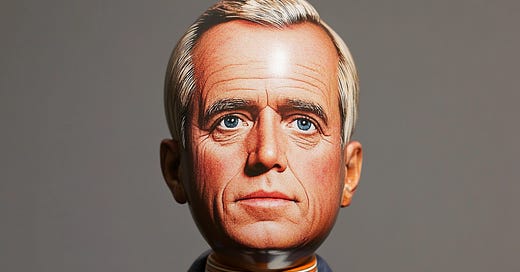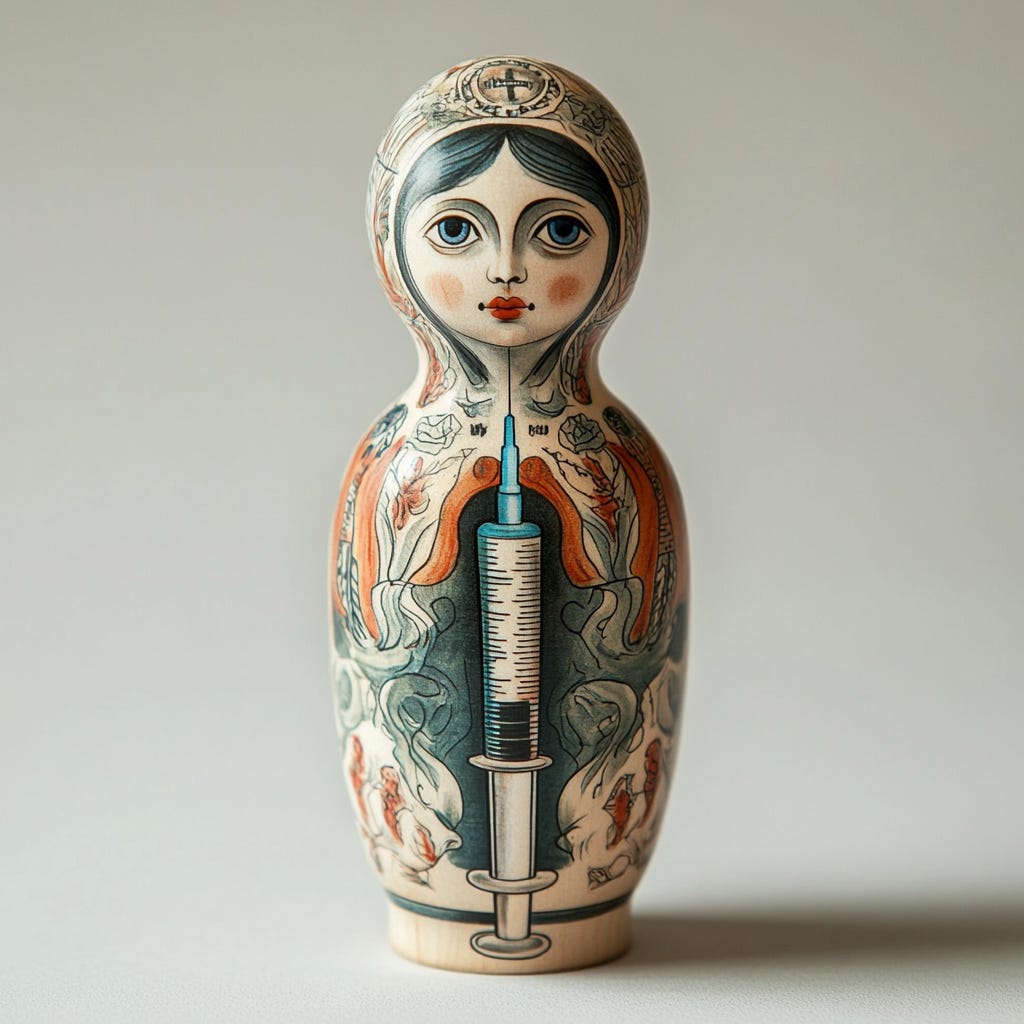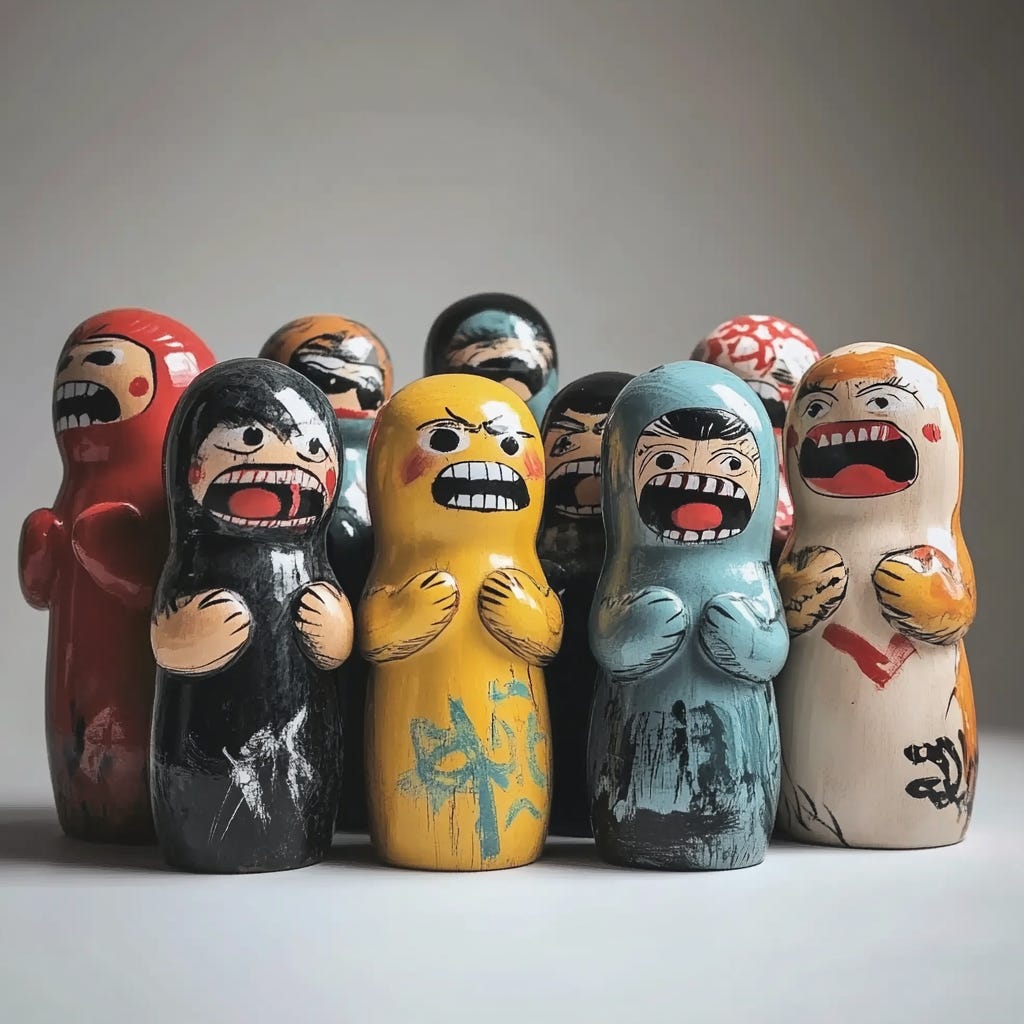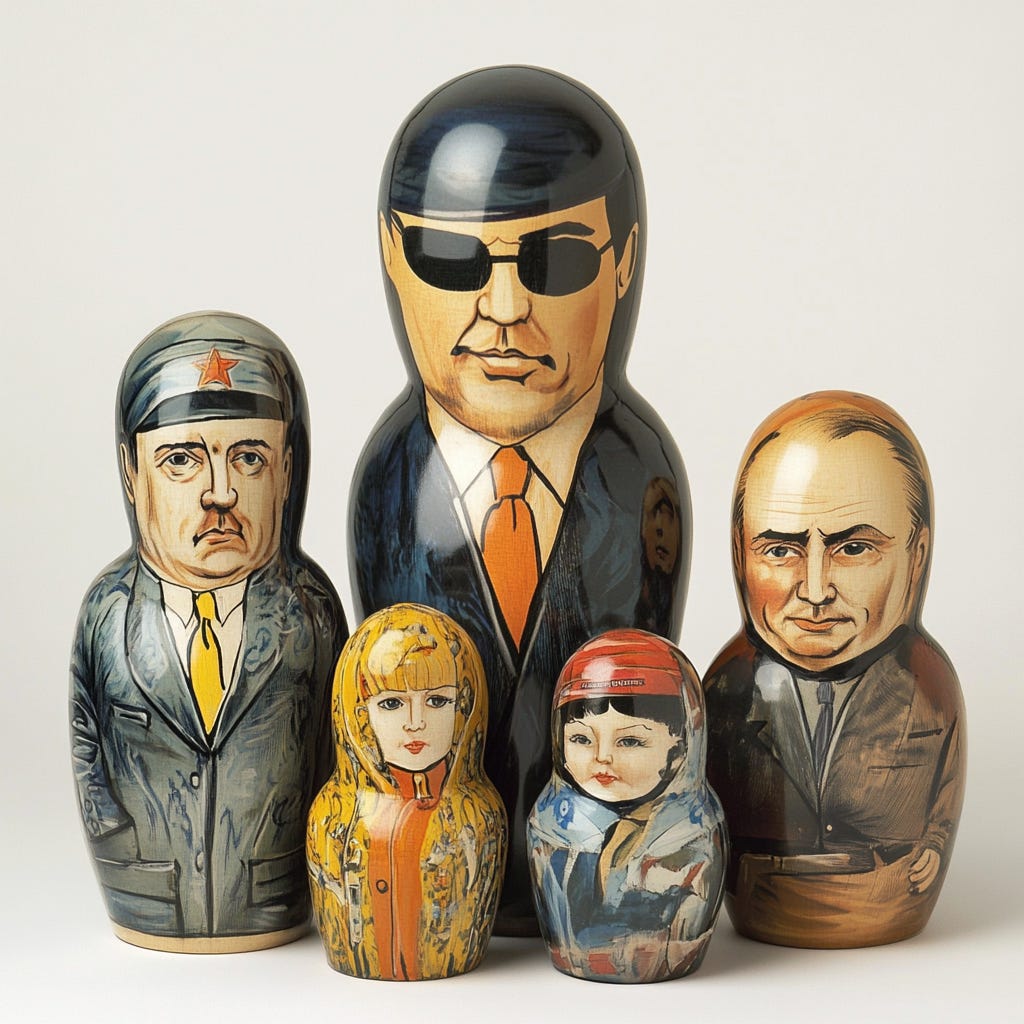Robert F. Kennedy Jr, the Conspiracy Matryoshka Doll
Now nestled inside the Trump campaign, RFK Jr contains multitudes of paranoid delusion
When Tucker Carlson introduced Robert F. Kennedy Jr. on his Twitter-hosted talk show last summer, he advertised it would be an exceptional interview. It would be the only conversation with the activist-turned-presidential candidate, Carlson proclaimed, that would not mention vaccines.
It was a hollow promise. Vaccines come up about halfway through the hour-and-a-half-long conversation, when Kennedy insist that COVID-19 was developed as a bioweapon. And, he says, “every bioweapon needs a vaccine.”
The interview did little to change the perception of Kennedy as an ardent conspiracy theorist. It wasn’t supposed to. Kennedy, sporting one of the most powerful names in American politics, was positioning himself to be a spoiler in November’s presidential election. Some figured that maybe, just maybe, the voters would abandon the worn faces of the Democratic and Republican establishment and make him president instead.
Over the past year, his quixotic campaign hit a high water mark of double-digits in the national polls, before settling to around five per cent. Despite risking also-ran status, he put everything into his crusade to tell the American people that the only conspiracy theory is the concept of the conspiracy theory itself.
In that way, Kennedy’s presidential campaign was never really about electoral politics. It was a clarion call to pick up pitchforks and torches and descend on those who taken over the country. More expansive than even Donald Trump’s warnings of a deep state, Kennedy said everything had been rigged: Government, corporations, the media, the medical establishment, the security services, everything. His political project has always turned on the idea that once people see it, they will rise up and tear down the façade.
Some of this might sound familiar. Kennedy, you know if you’ve read anything about him, doesn’t trust vaccines. He does not like Anthony Fauci. He thinks AIDS was made up.
But you haven’t, unless you are an ardent student of Kennedy, fully understood the depths of his delusion. Much of the coverage of Kennedy’s campaign has obsessed over the historical spirit imbued in his family and the screwball antics of the man himself. The press has obsessed over his brain worms and his role in a long-unsolved dead bear mystery. The press has noted with interest his attempts to moderate his paranoid politics into something that more resembles the promise of his slain father and uncle.
Today, Kennedy is expected to give up on his curious campaign and endorse Donald Trump for president, situating his own fantastical delusions inside those of his conspiratorial kindred spirit.
But it is worth understanding what, exactly, Robert F Kennedy Jr. believes. It is so much more fantastical, and terrifying, than even the constant media attention would have you believe.
Kennedy’s life has been defined by conspiracies. And for a long time, he was obsessed with fighting them.
In 1975, Senator Frank Church’s sprawling committee investigation raised some open questions around the assassination of John F. Kennedy, particularly around Fidel Castro’s possible involvement; and exposed widespread skullduggery by the CIA — including an assassination program, targeting world leaders with suspected Communist sympathies. When it came out, the young Kennedy was largely unmoved.
Writing in the Wall Street Journal at the time, he sniffed that there was “no conclusive evidence” tying his family name to this CIA murder campaign. He mocked the idea that there was “a partisan conspiracy to protect the Kennedy name.” (He didn’t seem to put much stock in the idea that Castro whacked his uncle: He sat down with the Cuban dictator in 1996.)
For a time, it seemed the conspiracies which interested Kennedy were of the criminal kind. In 1982, he snagged a job, through family connections, as a district attorney in New York — but failed his bar exam shortly thereafter and resigned. His career as a prosecutor was permanently kiboshed when, a year later, he overdosed on a flight to Rapid City and was arrested for heroin possession.
It was a pivotal moment in Kennedy’s life. Sentenced to probation and community service, his connections meant he could avoid picking up litter on the New Jersey Turnpike: Instead, he volunteered for a charity trying to clean up the Hudson River.
His starpower propelled him through the ranks of the charity, the Riverkeeper, where he spearheaded a series of successful lawsuits exposing how major industries were dumping toxic waste into New York’s waterways — and how the state let them do it.
Back then, he was picking up on a bubbling paranoia in American society. This was just two years after the Oklahoma City bombing, and a particular flavor of anti-government neurosis had taken hold of a large swath of American society. (Dispatch #51) Even in the scenic vistas of the Hudson Valley, this disquiet was obvious. Some locals saw him as “part of a conspiracy to establish a one-world government known as the New World Order,” he wrote in his 1997 book Waterkeepers. Fear of Communist infiltration had been replaced with distrust of environmentalists, he wrote. Conspiracy newspapers like The Washington Times were bibles for this new alienation.
But then Kennedy was faced with a conspiracy that he couldn’t unravel. His vocal activism about water contamination had made him a magnet for parents convinced that another kind of state failure had harmed their children. As he wrote in a Rolling Stone feature in 2005, these parents were certain their kids had been “injured by vaccines.”
“Privately, I was skeptical,” he wrote, but he slowly came around to the idea after someone handed him documents which, they said, proved a “cover up” at the highest levels of the Centres for Disease Control. A damning report had linked thimerosal, a common mercury-based vaccine preservative, to a dramatic rise in childhood autism. He began to investigate these troubling data, convinced he had stumbled upon yet another case of corporate malfeasance and government corruption.
He published his sprawling exposé in Rolling Stone, only to be met with a deluge of criticism from the scientific community. Far from complicit or corrupt, the CDC itself had already identified this possible connection and proactively ordered that thimerosal be removed from the vaccines. The author of this smoking gun report at the center of Kennedy’s exposé had never actually found a causal relationship between thimerosal and autism, as Kennedy claimed — just a weak correlation. The researcher’s subsequent study found no evidence of a causal relationship and effectively debunked the theory. Kennedy’s article was so ridden with errors that Rolling Stone printed three rounds of corrections to the story. (It would take another six years for the paper to fully retract the article.)
But Kennedy was certain. The criticism only made him more vocal. He continued repeating the debunked claims on network TV, and was given his own left-leaning radio show on Air America. He made allies with former model and vaccine critic Jenny McCarthy. President Barack Obama considered tapping Kennedy to head up the Environmental Protection Agency. (It was around this time that doctors discovered a dead parasitic worm in Kennedy’s brain.)
Unmoored from his claims about this one ingredient, long since removed from most childhood vaccines, Kennedy went wide. He was sure that the causation between autism and vaccines was there, he just needed to prove it. He went on the hunt for an organization which could push his vaccine conspiracy to the masses. He found it in the World Mercury Project, a small registered non-profit which had no significant donations or expenses to report as of 2014. Kennedy joined the board and became the chairman in short order, soon changing the organization’s name to the euphemistic Children’s Health Defense.
This newly-rebranded charity became a pseudoscience clearing house. Since Kennedy’s takeover, it has peddled debunked claims about the harms of wi-fi and 5G radio signals, endorsed naturopathy over modern medicine, and expanded his warnings about thimerosal into a broader, all-encompassing distrust of vaccines.
His anti-vaccine activism, and its online popularity, caught the attention of a politician with a masterful eye for conspiracy theories: Donald Trump. In 2017, even before his inauguration, the White House contacted Kennedy to offer him a job heading up a commission investigating vaccine safety. “He [Trump] is troubled by questions of the links between certain vaccines and the epidemic of neurodevelopmental disorders including autism,” Kennedy told Science in 2017. (That planned commission never materialized.)
As his conspiratorial star was rising, Kennedy suddenly converted to a new mythos that his family had spent decades fighting: He endorsed the idea that the CIA was responsible for his father’s assassination. Whatever trust he had placed in the Church Commission, nearly 40 years prior, was gone. It was just the beginning of Kennedy’s fixation with the nefarious deep state.
It’s January 2020, and Kennedy is speaking to Russian propaganda network RT: “The pharmaceutical companies — and particularly the vaccine-makers — use WHO to fabricate pandemics like the swine flu, like H1N1, and make billions of dollars on pandemics that never happened.”
This narrative he was workshopping, sharpened over the past few years at his growing anti-vaccine think tank, had never really been tested in a crisis.
And when the chance initially arose, Kennedy initially declined. As cases of a novel coronavirus began spreading across America, Kennedy tweeted: “Americans have stayed vigilant against conspiracy theories about #coronavirus. Experts say there are lessons for how we deal with #climatechange.” (The text was a subhedding for a FastCompany story about fighting disinformation.) A few days later he noted that the origins of COVID-19, likely from a wet market in Wuhan, show the need for better livestock regulations in China.
But Kennedy wasn’t about to give up an incredible opportunity to put theory into practise. He began writing about how Bill Gates' was pulling the strings behind all manner of international health organizations and pharmaceutical companies as the pandemic worsened. This was all “to force his dictatorial vaccine programs on all American children – and adults.” Suddenly, there was an audience for it. A massive one.
That summer, Kennedy travelled to Berlin to participate in a huge rally against public health measures. There, he openly compared the pandemic response to the setting-up of concentration camps. In a video message recorded during his trip, he warned that the response to this pandemic had all the hallmarks of “a pharmaceutical-driven security agenda that will enslave the entire human race and plunge us into a dystopian nightmare.” Asked whether this was a “plandemic,” Kennedy responded: “A lot of it feels very planned to me.”
The ensuing two years would be gangbusters for Kennedy and Children's Health Defense, and would happen in parallel to Kennedy’s own descent into madness. Their income rose tenfold in the span of three years, raising more than $23 million in 2022. They opened new local chapters across America, Canada, Australia, across Europe, and even established an office in Africa. They now have their own media outlet, film production studio, a network of podcasts, and an annual confab for the anti-vaccine who’s-who.
In South Africa, his organization hopes to become a part of the public health infrastructure. Last August, Children’s Health Defense, alongside other local anti-vaccine groups, formally launched the South African Vaccine Adverse Events Report System. Relying exclusively on unconfirmed reports from the public, the system claims to have identified “120 deaths after jab” in South Africa. (The South African government, which does monitor vaccine adverse reactions, has identified only two deaths caused by the Johnson & Johnson vaccine.)
Children’s Health Defense also has an imprint with Kennedy’s book publisher, Skyhorse. They have put their name on a string of books to capitalize on this growing anxiety, including Cause Unknown, by Ed Dowd — with a foreword by Kennedy — alleges a vast cover-up by the pharmaceutical industry of the “epidemic of sudden deaths.”
The explosion of the anti-vaccine movement had a symbiotic relationship with the general public. Children’s Health Defense, and its leader, both fed off growing skepticism of these vaccines and actively fed it. As a tin, it held a wild assortment of nuts. Each with their own lore of how the world had plunged into pandemic, each with a slightly different suspect list of who should be blamed. It partnered with any and every quack doctor willing to cast doubt on the vaccines’ safety and efficacy, the danger of the virus, or the merit of untested remedies.
In that sense, the people who swelled into the ranks of Children’s Health Defense were similar to those Hudson Valley locals who once tried to reject Kennedy like foreign tissue. Their conspiracy theories were adversarial and distrusting, but they were also crude and lazy. Kennedy, however, wanted to bring orthodoxy to it.
As he explained on his podcast, Kennedy’s target was nothing less than “the intelligence agencies, the military, these pharmaceutical companies; 533 out of 535 members of Congress; it’s the entire media, the entire social media.”
It’s 2021, and Kennedy has just published his anxiety opus: The Real Anthony Fauci.
The book has been referenced often but cited rarely. And no wonder: It is dense with inaccuracies, discredited researchers, and flimsy sources — including The Washington Times, which he once rejected as a crackpot paper. Nevertheless, the book rocketed onto the New York Times bestseller list, selling more than one million copies.
The book became a useful bible for the anti-vaccine movement — establishing as dogma, for example, that drugs such as ivermectin and hydroxychloroquine are safer and more effective than vaccines at combating COVID-19. (Claims which have been extensively and repeatedly studied and rejected.) But it’s in this book that Kennedy formally lays out his theory of the universe. And it all leads to infectious disease czar Anthony Fauci.
It started with HIV, Kennedy posits, which is not a virus at all — but a form of cancer brought on by the recreational use of amyl nitrate, or poppers. It was “the gay lifestyle…burning the candle at both ends” which killed millions, Kennedy argued in a speech last year, not HIV/AIDS.
This lie was necessary, Kennedy argues, because Fauci needed a push to advance his career at the National Institute of Allergy and Infectious Diseases. Bribed by Fauci, “gay publications and organizations continued to promote poppers and censure stories about their health risks,” Kennedy writes. Fauci partnered with drug companies to sell AZT, and score huge profits. While the antiretroviral drug associated with massive delays in the onset of AIDS, Kennedy argues it was actually “mass murder.” (Dispatch #59)
But the AIDS crisis was just a trial run, Kennedy writes. It was not until after the 9/11 attacks that the mild-mannered villain put his plan into high gear with the anthrax attacks of 2001. They were not, he argues, the work of disgruntled Pentagon employee Bruce Ivens, as investigators concluded. “It's clear that was a cover up,” he explained on his podcast.
Kennedy never really accuses a single person or department for being responsible for the anthrax attacks — in effect, he blames all of them. Fauci, the CIA, the Pentagon, Big Pharma, Bill Gates, and all the rest. Quoting a random Maine doctor in a subsequent book, The Wuhan Cover-Up, Kennedy posits: “Many people consider Ivins a patsy in a monumental government cover-up of a false flag event that launched the modern security state.”
In his retrospective on these years, any evidence of precaution — chiefly tabletop simulations preparing for biological weapons attacks and vaccine research — became evidence of complicity. Any research on emerging pathogens, conducted anywhere in the U.S. government, became proof that Fauci was trying to weaponize those pathogens. It was all with an eye for the next attack.
“In the wake of the September 2001 anthrax attacks,” Kennedy writes, Fauci began aggressively “wooing” the military and security apparatus. “He now had the capacity to teach animal pathogens to leap to humans, spread quickly, and kill more efficiently. He had, in short, demonstrated the chilling potential of exploiting the ‘dual use’ loophole for backdoor bioweapons development.”
COVID-19 was such a bioweapon, Kennedy believes. When it accidentally leaked, the cabal sprang into action to take advantage of the crisis and enact “the coup d'état against liberal democracy globally.” And, just as Fauci had used AZT to enrich himself at the expense of the lives of thousands of gay men, he would now peddle vaccines, no matter the death toll.
Fauci couldn’t well house this bioweapons program at home, so he shipped it off to China. COVID-19’s accidental leak had nearly blown the whole operation — but, RFK argues, Fauci rolled with it and launched his sprawling totalitarian conditioning operation anyway. But there is so much more out there to be afraid of, he believes.
On Carlson’s show, speaking to his 13 million viewers, Kennedy insisted “I’m not an apologist for Putin.” Yet Kennedy had clearly been intrigued by Carlson’s own pet theory of COVID-19 and the Ukraine war, fostered by QAnon and supported by Moscow itself, that the invasion of Ukraine was conducted to dismantle and destroy American-run “biolabs.”
Throughout his campaign, Kennedy had used his podcast to interview useful idiots for the Russian government. He had friendly chats with Max Blumenthal, who has testified on Russia’s invitation at the U.N; former CIA officer John Kiriakou, who now hosts a podcast with Russian propaganda channel Sputnik; former RT reporter Riley Waggaman; and other, uniformly pro-Russian, voices. In those interviews, Kennedy made clear that American “neocon think tanks and globalists” were the ones responsible for the war.
As Kennedy explained to Carlson: “We have biolabs in Ukraine because we’re developing bioweapons.” Not just bioweapons, he would tell Elon Musk later, but “ethnic bioweapons, that kill people from certain races.” Washington and Kyiv had been caught, so Ukraine mounted its “murderous war, a genocidal war against ethnic Russians” to cover it all up.
“The government lies to us, we all know it,” Kennedy told placard-waving supporters at his first campaign launch last year. What’s more, he said, “the media lies to us now, and everybody knows that.” Even efforts to combat misinformation, he said, is just proof “you’re being lied to.”
As he explains in his book, Fauci’s co-opting of the security state wasn’t just about making biological weapons, it was about control. Fauci had become tightly involved in Operation Mockingbird — the very real CIA campaign to surveil journalists, revealed by Senator Frank Church decades earlier. Operation Mockingbird hadn’t just survived being exposed, it thrived. It had been used to quell dissent from the official story of his uncle and fathers’ assassinations, was now being weaponized by Anthony Fauci to obliterate democracy. Fauci was now in control, he wrote, of “potent brainwashing technique for creating and fortifying anti-democratic orthodoxies among key political leaders, the press, and the technocracy, and preparing the nation to tolerate a coup d’état against its constitution without resistance.”
The only way to fight it, Kennedy says, is to run against it.
Kennedy began by seeking the Democratic Party nomination and, once that floundered, he launched his bid as a third-party candidate, showed some initial promise before fizzling out. It was, nevertheless, a high-price affair: His campaign raised $57 million, while a pro-Kennedy PAC raked in another $50 million. His donors have included the business arm of the anti-vaccine Awaken Church, banking heir billionaire Timothy Mellon, security consultant Gavin de Becker, and Kyle Kemper, half-brother to Canadian Prime Minister Justin Trudeau. (Dispatch #62)
But his official campaign had few of the trappings of a normal political operation. Instead, Kennedy spent much of his time popping up on podcasts, livestreams, or at cryptocurrency conferences.
On some, Kennedy struck a heuristic tone: Appealing to unity, compromise, and conversation. On others, though, he lifted his top and exposed the increasingly-more paranoid thoughts lurking underneath.
Despite warning just years ago that big corporations were using disinformation to hobble environmental activism, Kennedy told Jordan B. Peterson that climate change has become a “pretext for clamping down, for totalitarian control, the same way that the COVID crisis was. And it's the same people: It's intelligence agencies, it's the World Economic Forum.” In a sprawling conversation about mind control with Roseanne Barr, Kennedy insisted that America’s bioweapons program is really just a continuation of the Third Reich and that “the culture…of the CIA, to this day, reflects a lot of the ethics and moral underpinnings and assumptions of those original Nazi progenitors.” In a conversation with Glenn Beck earlier this year, Kennedy insisted that the "only reason he [Fauci] is not in jail is because Biden is president.”
In the media, Kennedy is often referred to, simply, as an anti-vaccine activist. But that title doesn’t do him justice. He’s a conspiracy messiah.
Kennedy’s strange odyssey to the heart of American paranoia has built an incredible meta-theory which tells his supporters that they have fallen victim to medical experimentation and biological warfare. The only reason they haven’t noticed is because they have been attacked with relentless brainwashing and propaganda from all sides. The government has not resisted because it has been co-opted, the victim of a regime change that happened long ago. It is impossible to tell who is, and is not, part of this tentacular beast: It could be your mailwoman, your neighbor, the man standing on the corner.
Millions have joined Kennedy on this failed crusade. But in the same way his campaign was a vessel for his expansive and impossible theory of everything, he will now tuck himself inside Donald Trump in hopes the mercurial ex-president will finally bring him into the center of American power.
That’s it for this dispatch!
This week, I published a deep-dive into the state of Russia’s disparate separatist movements, and attempts to get them on the same page. Here’s a gift link, so you can read for free. I also penned a long call-to-arms to finally log off Twitter.
If you’re not yet a paying subscriber, there’s no better time to sign up than now!
Until next week.








I can't help but think RFK Jr. is like the protagonist in Pink Floyd's The Wall: "and the worm(s) ate into his brain." He's built up a wall of lies and grievances against those he perceives of having wronged him, and whipped followers into a state of frenzy against those shadowy forces. One day, his wall will come down with a loud crash. Thank you for exposing just how deluded and dangerous he's become.
Maybe I'll come back and finish the last 80% if I need the entertainment, but it would be no more interesting than the theories of my local dumpster-diver if Kennedy were from any other family.
And Teddy died in 2009; 70 million voters under 35 have no real connection to the name. It was never more than a Pat-Buchanan level of challenge; certainly didn't arise to the level of Ross Perot.